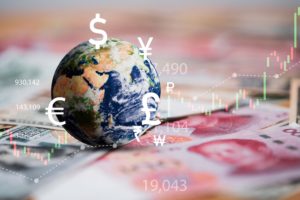Market Update 25th March 2024

No retreat, no surrender
If you had been doing the same thing every day since 2007 and it suddenly came good in a small way last week, would you feel it was a success? Is it a triumph of patience, fortitude and stoicism, or is there something else you could have done? I’m undecided.
Japan increased interest rates on Tuesday for the first time in seventeen years. They also announced the end of their zero interest rate and yield curve control policies. Yield curve control ensured the yield on the 10 year JGB couldn’t go over 1%. Perhaps surprisingly this weakened the yen even further, sent indebted real estate funds higher and JGB yields fell. They are going to continue buying JGBs, but will stop buying ETFs and J-REITs, which have historically been a hedge against falling bond prices. The BoJ owns over half the JGB market.
There are a few possible explanations for this. Firstly, it could be more about US dollar strength than yen weakness. Secondly, while the move in interest rates has been widely expected at some point, it has come earlier than the market thought, and policy remains loose. Future rate rises will be data driven and dependent on whether or not inflation stays somewhere around 2%. As of Friday, Japan’s core CPI is 2.8%, and maybe worth noting it fell in Japan with no additional input from the central bank.
In his statement, BoJ Governor Kazuo Ueda emphasised he didn’t see a sharp wave of further tightening, and made a virtue of a cycle of higher wages and higher inflation, whereas in the UK for example, the BoE were warning people against asking for pay rises as early as February 2022, when the BoE raised rates from 0.25% to 0.5%. Japan still has the highest debt burden in the developed world and an ageing population.
For some time now, it has not been a compliment to compare any country to Japan, even slightly. China for example has started to show some similarities to Japan’s economic history in its boom and bust cycle. The population is also ageing in the West, and at the very least this puts a strain on the growth model we all follow. The narrative is usually other countries falling into the same unavoidable problems as Japan. But the re-emergence of inflation in the wake of Covid has reversed some of this and it may be that the rest of the world is now pulling Japan up with it in an inflationary cycle.
Why does any of it matter to us? Japan’s monetary policy has always had global implications. They essentially invented QE, adopted wholesale by the West in the wake of the Global Financial Crisis. In turn, the lack of return on their domestic assets, has led Japan to become one of the biggest buyers of foreign assets in the world. They own over $1tn of US treasuries and over €0.5tn of euro bonds. The total comes to nearly $2tn world-wide. Will they carry on like this if their own domestic bonds look more attractive? When buying US treasuries, the BoJ hedges the currency and net of the cost of this, they have been getting a negative return on US treasuries for a couple of years already – they are historically expensive for Japanese investors. Fairly obviously they will stop doing this quite quickly if a viable domestic alternative becomes available.
We have touched on this in previous Innovations – there is already a big rotation taking place in the ownership of Western government debt, with China also pulling away for its own reasons. This makes capital more scarce as people become more picky about who they want to lend money to and I think we are already seeing some effects of this. Capital markets of course gave a big thumbs down to Liz Truss and her budget in October 2022 – she might have been okay, say 5 years earlier and no Covid. Fitch gave us all an unwelcome reminder of this when they upgraded the UK credit outlook on Friday – 18 months later, having downgraded in the wake of her budget. The renewable energy sector ran into trouble in 2023, as the cost of capital increased and the market started to decide which projects it really wanted to finance in these changed circumstances.
Japanese equities have been by far the best performing major asset class in Q1 2024, outperforming even the S&P 500, although the continued weakness of the currency is detracting from total return if it is not hedged.

Robert Fullerton – Senior Research Analyst
Hawksmoor Investment Management Limited is authorised and regulated by the Financial Conduct Authority (www.fca.org.uk) with its registered office at 2nd Floor Stratus House, Emperor Way, Exeter Business Park, Exeter, Devon EX1 3QS. This document does not constitute an offer or invitation to any person in respect of the securities or funds described, nor should its content be interpreted as investment or tax advice for which you should consult your independent financial adviser and or accountant. The information and opinions it contains have been compiled or arrived at from sources believed to be reliable at the time and are given in good faith, but no representation is made as to their accuracy, completeness or correctness. The editorial content is the personal opinion of Robert Fullerton. Other opinions expressed in this document, whether in general or both on the performance of individual securities and in a wider economic context, represent the views of Hawksmoor at the time of preparation and may be subject to change. Past performance is not a guide to future performance. The value of an investment and any income from it can fall as well as rise as a result of market and currency fluctuations. You may not get back the amount you originally invested. Currency exchange rates may affect the value of investments.
View more news
